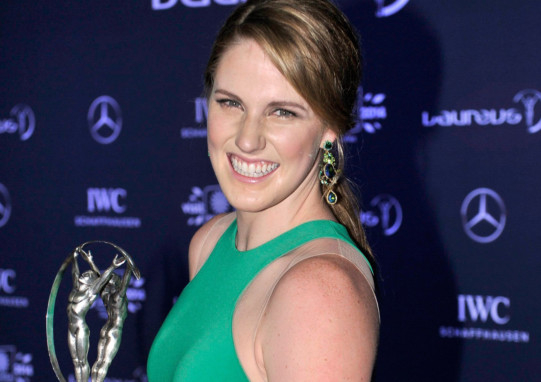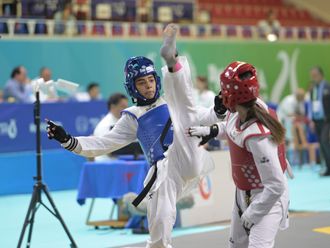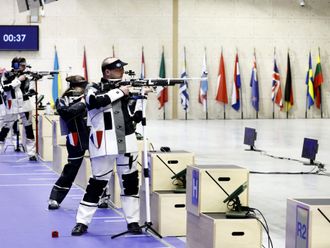
Kuala Lumpur: For swimming superstar Melissa ‘Missy’ Franklin, life is as saccharine sweet as her American teen sweetheart demeanour.
Her magnificent haul of six gold medals at last summer’s World Championships in Barcelona — a record for the event — led to her winning the unofficial Oscar of sport, the Laureus World Sportswoman of the Year Award, on March 26.
That was no mean feat, the 18-year-old having prevailed over strong competition from the likes of Serena Williams, the finest tennis player on the planet and one of the greatest in history.
Little wonder, then, that Franklin resembled a child at Christmas both on receiving her award and in the build-up to the prestigious ceremony.
Bubbly and incessantly smiley and giggly, everything in Franklin’s universe is, in her own words, “awesome”, “incredible” or “unbelievable”, and she treats journalists with the same warmth and cheerfulness as she would her most cherished friend.
Not even questions about the chore of studying at college can tarnish her utopian existence.
The 6ft 1ins Californian, who is majoring in psychology at the University of California, Berkeley, says the relentless grind of academia, which she is pursuing while eschewing prize money and endorsements as an amateur, is “really great and so much fun”.
Her admission becomes all the more impressive (or sickening, depending on how cynical you are) when you consider the additional burden she carries on her broad shoulders — that of being an elite sportswoman.
Franklin, who shot to worldwide prominence by winning four gold medals at the London 2012 Olympics, wakes up at 5am every morning and dives headlong into an exhaustive and exhausting schedule of classes, revision, swimming and fitness work.
“It’s definitely a little hectic, I don’t have much free time at all,” she admits matter of factly without a hint of regret, before giggling girlishly as she recited her repetitive and gruelling regime.
Daily routine
“I wake up normally around 5am, train for two hours in the morning, then I have class. Then I come back and we have weights for about an hour, then we train for another two hours, then I have class after that. Then I have class after that, then I have homework after class. And then we get up and repeat it next day. I go to bed at 9pm and we don’t even have a TV in our dorm.”
“I love what I do so much and every sacrifice seems so small,” she added. “Everyone has to sacrifice something, whether it’s for your job or for school. It teaches us so much about ourselves if we are willing to give up things and work hard to reach our goals.”
For most top athletes with super-sized egos to match their voluminous talents, having to deal with frugality of student life would be simply unbearable having been inured to sumptuous hotel suites and haute cuisine.
Yet Franklin insists things have not changed dramatically since she won global sporting recognition, apart from the burgeoning attendances to watch her in action at college swim meets.
“It’s honestly not that different to before,” she said. “It’s a really normal experience and really fun.”
One journalist present at the pre-Laureus awards media briefing thought she would probe for a chink in this epitome of blissful contentment’s armour.
Had she struggled to work the washing machine, as the retired American swimming great Michael Phelps did in his first year at university, she asked?
Freshman blues
“I’ve had the same struggles as every freshman at college, living alone,” Franklin replied, with a trademark flurry of laughs.
“Being away from home, being away from your family, eating dorm food and cafeteria food all the time, doing your laundry for first time, it’s all part of the experience.
“That’s exactly why I wanted to go to college, to get those experiences. My roommate is a freshman on the team and we’ve become best friends. It’s just like a roomie match in heaven. It’s been really great, so much fun and I’ve already made friends on the team that I know I am going to have my whole life, which is why I’m doing it.”
Yet while she portrays herself as an ordinary teenager, Franklin would not be one of the greatest swimmers in the world if she did not possess an extraordinary competitive instinct.
“I think one thing I’ve realised through swimming is I am able to flick a switch,” she said. “And that’s where I can be really bubbly and really happy and really excited but when it is time to race, I know it and I am able to really home into what I am doing and focus on the event coming up. I am still having fun while I am doing that.
“But the sensation of being in the zone is incredible and that’s one reason we do our sport, for that moment. [It’s great] right before we race, when you know you’ve put in the work, know you’ve put in the training, and you’re behind the block and you’re just ready.”
She went on: “That excitement of feeling you can’t wait to get out there and show everyone what you can do and prove to yourself what you can do, there’s no better feeling than that. So that’s why I like to smile before a race: To remind myself to have fun and remind myself why I am doing it.”
Franklin would be forgiven for being crippled by fear at the prospect of following the strokes of genius achieved by American swimming legends, Phelps and Mark Spitz.
Yet she insists she is inspired by their Olympic medal-winning magnificence of the past and is eager to create her own legacy.
“I want to have my own goals and aspirations,” she said.
“Watching what these athletes have done is absolutely inspiring. I’d love to accomplish something like [what they did] some day.
“My relationship with Michael is incredible. He’s offered assistance and been absolutely incredible. I feel like it’s hard to be called the female Michael Phelps. Because there really is no other Michael Phelps, male or female.
“He’s so unique. What anyone does would never be the way he did it.
“And it’s just so incredible to know that he’s Michael Phelps. So I always want to say I’m the female Missy Franklin and hopefully create my own legacy.”
A meeting with Spitz, who claimed a then-world record seven gold medals in the pool at the 1972 Olympic Games (Phelps won one more at the 2008 Games), transformed Franklin into a starstruck teen meeting her pop idol.
Of her encounter ahead of the Laureus World Sport Awards, she said: “I met Mark Spitz in the elevator yesterday morning. And he was like, ‘Missy?’ and I was like. ‘Yeah?’.
“I didn’t recognise him without the moustache. He was like, ‘I’m Mark Spitz’. I was like, ‘Oh my gosh, do you know how cool you are?’. And I totally fan-girled.”
Under her coach Teri McKeever — she ended her ten-year association with former mentor Todd Schmitz last year — Franklin insists she has “room for improvement” despite her Barcelona heroics.
Live in the present
But she says her thoughts have not yet turned to the 2016 Rio Olympics, revealing she prefers to live in the present. Furthermore, like Phelps, she wants to transcend her sport.
She said: “He showed how awesome it [swimming] is. I’m a little biased but I think it’s really incredible, not just in terms of a sport, but also in terms of safety. It’s getting people to be water safe. That’s one of my goals as an athlete in this sport.
“I really want to raise awareness about making children water safe and getting them involved in local swim teams, whether they are doing it competitively or just for fun.
“It’s a great way of meeting new people. I‘ve learned so much about myself from this sport. It’s changed my life.”
Mature beyond her years, Franklin is acutely aware that a sporting career can be a brief one, and therefore recognises the need to focus on other things in life.
Biggest goal is to be a mum
“One of my biggest goals in life is to be a mum,” she said. “I want to have a family some day. I kind of know I am meant to be a swimmer and I know I am meant to be a mum one day. I think it’s important to have dreams and goals outside your sport.
“Although swimming is such an important part of who I am, it doesn’t define who I am.
“That’s one of the things sports can teach us. It can show us about ourselves and teach about ourselves, but it doesn’t define ourselves.”
With such a wise head on her young shoulders, allied to her innate skill and work ethic, Franklin is surely destined for further greatness.
And whatever she does in the future, it’s certain she will be deliriously happy doing it.











